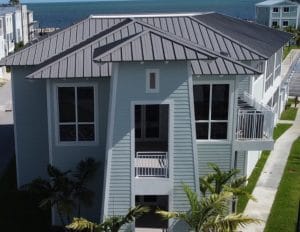
STEEL VS. ALUMINUM ROOFS: WHAT’S THE DIFFERENCE?
BY: NICK LEE
PRESIDENT AT COASTAL METAL (MIAMI, FL)
As roofers, we know the phrase, “location location location” isn’t exclusive to real estate industry. When choosing between a steel and aluminum roofing system, the location of your project can determine which material will best suit your needs.
Steel Roofing 101
Environmentally-friendly, sturdy and easy on the wallet, Steel is the most common material used in metal roofing. Steel roofs are a solid choice for the vast majority of roofing projects, especially where value is important. Many steel roofing products come with hard-to-beat 40 to 50-year warranties. However, in comparison to aluminum, steel is a lot more susceptible to seawater damage making it a bit undesirable for coastal applications. Over time, moisture from the ocean oxidizes the iron component in steel, creating ferric oxide, more commonly known as rust. Steel manufacturers fight rust formation by coating panels with either zinc or Galvalume in order to form a protective barrier.
Steel roofs offer a number of benefits, including:
- Durability/Gauge – The lower the number, the more durable the metal. Steel panels range from 22 (thickest) to 29 gauge.
- Fast Installation – Steel roofs can be installed quickly. Certain steel panels have clipless, snap-and-lock installation systems that expedite the process.
- Cost Effectiveness – When compared to other metals, steel is the least expensive. A steel roof also saves you money by keeping your heating and cooling costs low. Steel has a higher reflectivity than other roofing materials. In the hotter, summer months it deflects sunlight from being absorbed, and in the winter, acts as an insulator, reflecting and circulating heat from the underside of the roof back inside the building.
- Fire Safety – Steel roofs are completely fire-resistant. A class-A, noncombustible roofing material, steel insulates against sparks and can ultimately prevent a fire from spreading into a home.
- Aesthetic Versatility – Steel is customizable and can mimic the look of wood, tile, slate or shingles. Steel panels can also be painted or designed to complement the unique appearance of a home.
- Environmental Factor Resistance – Steel is impermeable to algae and fungi that oftentimes shorten the lifespan of other roofing materials like asphalt or wood shingles. Steel is not hospitable to pesky critters that tend to take refuge in roofs (termites, rats, racoons, etc.)

Aluminum Roofing 101
Aluminum is among the premium choices when it comes down to metal roofing material. Similar in quality to its more expensive cousins, copper and zinc without the price tag, aluminum is still around 20% more expensive than steel. Offering superior protection from saltwater corrosion, aluminum roofing systems are ideal in coastal environments. Due to its price, aluminum is often manufactured in a much thinner panels than other materials as well. While aluminum roofing material’s strength-to-weight ratio is higher than steel, the factor of cost often results in panels that are too thin for their surroundings. In regions with high winds, hail, or strong environmental stresses, this can result in damage to the roofing material. Properly identifying the environmental strains that your aluminum roof will face will be crucial in choosing the right design.
A few things to know about aluminum:
- As a bare, natural metal, aluminum does not age gracefully, so oftentimes it’s finished with a painted surface.
- Aluminum used for roofing applications tends be very malleable and easy to work with onsite, making it a forgiving material for most installers.
- Aluminum is one of the lightest metals used for roofing. It’s strength-to-weight ratio is among the highest of the “common” metals (that’s why most of the airliners in the sky use aluminum for their air frame), and therefore, a thinner piece of aluminum can often do the job of a thicker piece of any other type of metal.
- Price-wise, aluminum falls somewhere in between most of the finished steels and copper and zinc.
The Steel vs. Aluminum Takeaway
Whether you are a builder in charge of constructing a new home or a homeowner interested in upgrading to a metal roofing system, deciding whether to go with steel roof panels or aluminum roof panels is a valid concern.
Steel and aluminum are dependable, metal roofing materials but there are distinct differences and advantages of both types that one should consider. For example, aluminum and steel are two of the most energy efficient roofing materials on the market; they’re naturally reflective, and usually equipped with coatings that meet LEED and Energy Star compliancy.
In term of cost and weight, steel is a heavier material, more dent resistant and less expensive than aluminum. In addition, steel panels are inherently sturdier and totally fire resistant, even without an underlayment. It is an attractive roofing solution for inland projects and new builds. Aluminum is the better choice for homes or buildings located along a coastline or for jobs that involve retrofitting a metal roof over existing shingles. Aluminum is a much lighter metal so weight would not be an issue if a homeowner or business owner wanted to upgrade their existing roofing system. Aluminum is typically more expensive but it is much more rust resistant. Salt water is corrosive to steel roofs, so anyone living close to the ocean should consider aluminum over steel for this reason alone.
“When choosing between steel and aluminum, think about why you’re opting for a metal roof in the first place,” says Albert Del Sol, project manager at Isaac’s Roofing in Miami, FL. “Structurally speaking, a steel roofing system is sturdier but will never outperform aluminum on the Florida coast where saltwater is known to cause roof corrosion. It’s all about your location, choose your metal accordingly.”
Ultimately, the locale and needs of your project are going to dictate which you use. If the project is near the ocean and not in hurricane territory, the choice will probably be aluminum. If you’re out West and brushfires are a concern, you’re better off with steel. If your concern is the added weight of a metal roof being retrofitted over an old shingle roof on an existing building, then you may want to think aluminum or a light gauge steel.
